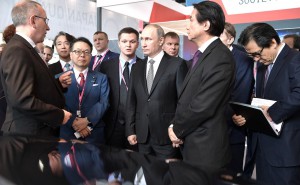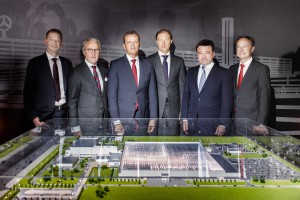
Russian President Vladimir Putin, center, listens as Nissan executives discuss plans to add 450 workers to its St. Petersburg plant.
The promise of a modest recovery in the Russian auto market continues to preoccupy car makers in emerging Europe, which are stepping up production and introducing new models to establish a strong position as the market recovers, according to a new analysis from BMI Research.
BMI, a division of the Fitch Group, said in a new analysis that automakers appear to be positioning themselves to capitalize on this with Russia accounting for 16 of the 22 investment projects announced in Emerging European markets – Turkey, Belarus, Czech Republic and Romania – during the third quarter.
Ukraine, where the western-leaning government has been caught up in continuing strife with Russia, attracted only one relatively small automotive-oriented investment even though it is considered one of the most industrialized countries in Eastern Europe.
In Russia, both Nissan and Ford Sollers introduced new shifts at their lead plants while PSA Group, Hyundai Motors, Isuzu and AutoVaz all started or announced plans to begin production of new models or refreshed versions of bestselling models at their Russian factories, BMI noted in its report.
(Nissan running with the bulls in Russia. For the story, Click Here.)
BMI said with domestic sales still considerably lower than past record volumes, overcapacity is still an issue across Russia so most investments have not involved expansions in potential capacity.

Daimler and Russian officials show off the model for the new Mercedes-Benz plant just outside Moscow.
The one exception is the $1.7 billion investment by Kamaz and Daimler AG in a pre-existing joint venture. The investment involves construction of a new truck cab manufacturing plant and is a strong show of confidence in the recovery of the Russian and neighboring Commonwealth of Independent States heavy-truck markets.
(Click Here for details about Daimler’s new plant in Russia.)
Daimler’s decision to expand its joint venture operations is also a sign of the company’s faith in its Russian partner and the sustainability of the partnership, BMI said.
The construction of $330 million plant by BelGee, a Chinese-Belarusian joint venture manufacturing Geely-branded vehicles is also adding to the diversity of the Belarusian autos industry, complementing earlier investments by PSA Group in the country in October 2014.
With a spread of Asian, U.S. and European producers now present in the country, production is set to benefit from a more diverse set of investors which will help develop the physical and human capital of the Belarusian automotive industry, as well as lower the risks of a downturn if one producer decides to cut back on production.
(To see more about expanding auto investments in Russia, Click Here.)
Growth in car production in Slovakia over 2017–21 will be largely driven by Jaguar Land Rover’s new manufacturing facility coming online in 2018, growing domestic car sales and healthy European demand for Slovak automotive exports.
